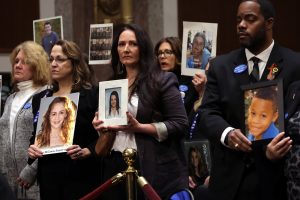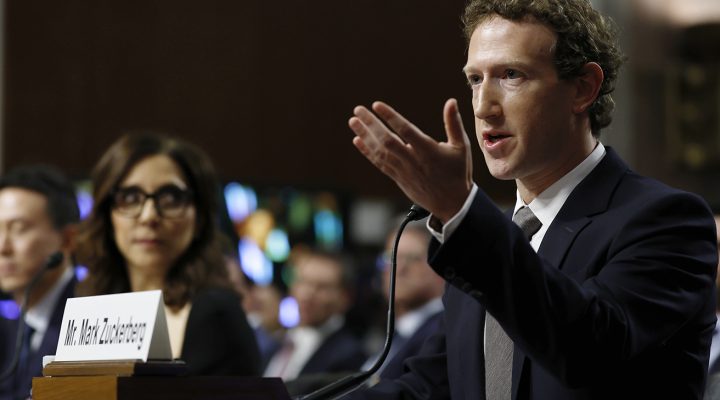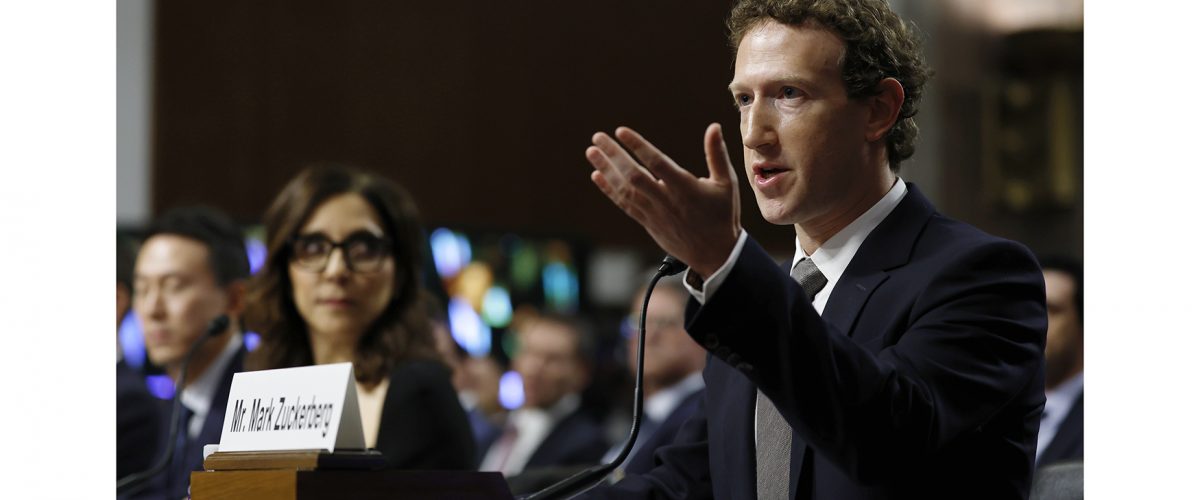Republicans and Democrats came together Wednesday to criticize executives from Meta, X, TikTok, Snap and Discord for creating a nationwide “crisis” by putting profits ahead of protecting children and teens from bullying, harassment, exploitation, mental illness, sexual trafficking and even death.
“Your product is killing people,” Sen. Josh Hawley, R-Mo., told Mark Zuckerberg, CEO of Meta, which operates Facebook and Instagram, during a nearly four-hour Senate hearing. Sen. Lindsey Graham, R-S.C., told the executives they had “blood on their hands.”
Seated behind the executives were parents holding photos of the children they said they lost to social media abuse and sexual exploitation. Some parents endorsed the Kids Online Safety Act, which is supported by some companies.

Audience members hold photos of loved ones during a Senate Judiciary Committee hearing at the Dirksen Senate Office Building on January 31 in Washington, D.C. (Photo by Alex Wong/Getty Images)
After Hawley goaded Zuckerberg to apologize to the parents his company had harmed, Zuckerberg apologized for the pain they had endured without citing Meta as a culprit.
Last October, more than 40 states sued Meta, claiming it is designed to maximize user engagement and advertising revenue, not prioritize safety for users.
It’s not clear that the bipartisan spirit will endure long enough for Congress to create its first legislation addressing the harms of social media companies. While a handful of states in America have passed regulations, there’s no national legislation here as there is in the United Kingdom and the European Union.
“Dozens of bills have failed after partisan bickering over details and lobbying efforts by the tech industry,” reported The New York Times.
Currently, tech companies are shielded from lawsuits by laws that grant them immunity from prosecution for platforming content that is created by others. The First Amendment also gives social media companies broad leeway.
Tech companies announced new measures to protect children in the weeks and days before the Jan. 31 hearing, and executives promised to work with Congress on legislation. But these corporations have consistently lobbied and used lawsuits to oppose such laws in the states.
Not represented on Wednesday were YouTube and Apple. YouTube is the most popular app for American teens.
One revealing line of questioning showed how many employees the firms dedicate to content moderation and user safety:
- Meta: 40,000 people.
- TikTok: 40,000 people.
- X: 2,300 people.
- Snap: 2,000 people.
- Discord: “hundreds of people.”
The Senate hearing happened as AI-generated sexually explicit deepfake videos of Taylor Swift have swamped X.
Linda Yaccarino, CEO of X, formerly Twitter, claimed fewer than 1% of X’s 90 million U.S. users were minors. “We do not have a line of business dedicated to children,” she said.
But research shows that “X ranks as the sixth-most used form of social media for teenagers,” with 23% of U.S. teens using the app.
Focus on the Family weighed in last Friday, defending X and proclaiming, “Taylor Swift Deepfakes Should Inspire Outrage — But X isn’t to Blame.”
“Several high-profile media covering the outlets imply Elon Musk enabled the musicians’ victimization,” said Focus, but “X’s policies explicitly prohibit content like the deepfakes of Swift.”
Focus favors the Wild West approach of X under new owner Elon Musk over the “censorship” exercised by Twitter, its predecessor. Musk fired many of Twitter’s content moderation contractors after he bought he company in 2022 and last year was continuing to make “deeper cuts into its already radically diminished trust and safety team.”
Twitter kicked Focus, Donald Trump, Alex Jones and others off the platform for violations of policy, but Musk’s X has invited them and others back.
“If I had to choose between the two … I’d rather wade through chaos than deception,” wrote Focus Vice President Paul Batura.
The Anti-Defamation League has criticized Musk for a rise in hate speech on X, and a report from the Center for Countering Digital Hate said X had failed to take action on 86% of posts containing hate speech. Musk has accused the ADL of “trying to kill X,” and X has sued the Center for Countering Digital Hate.
But Focus defends Musk’s stewardship of X as a good thing.


